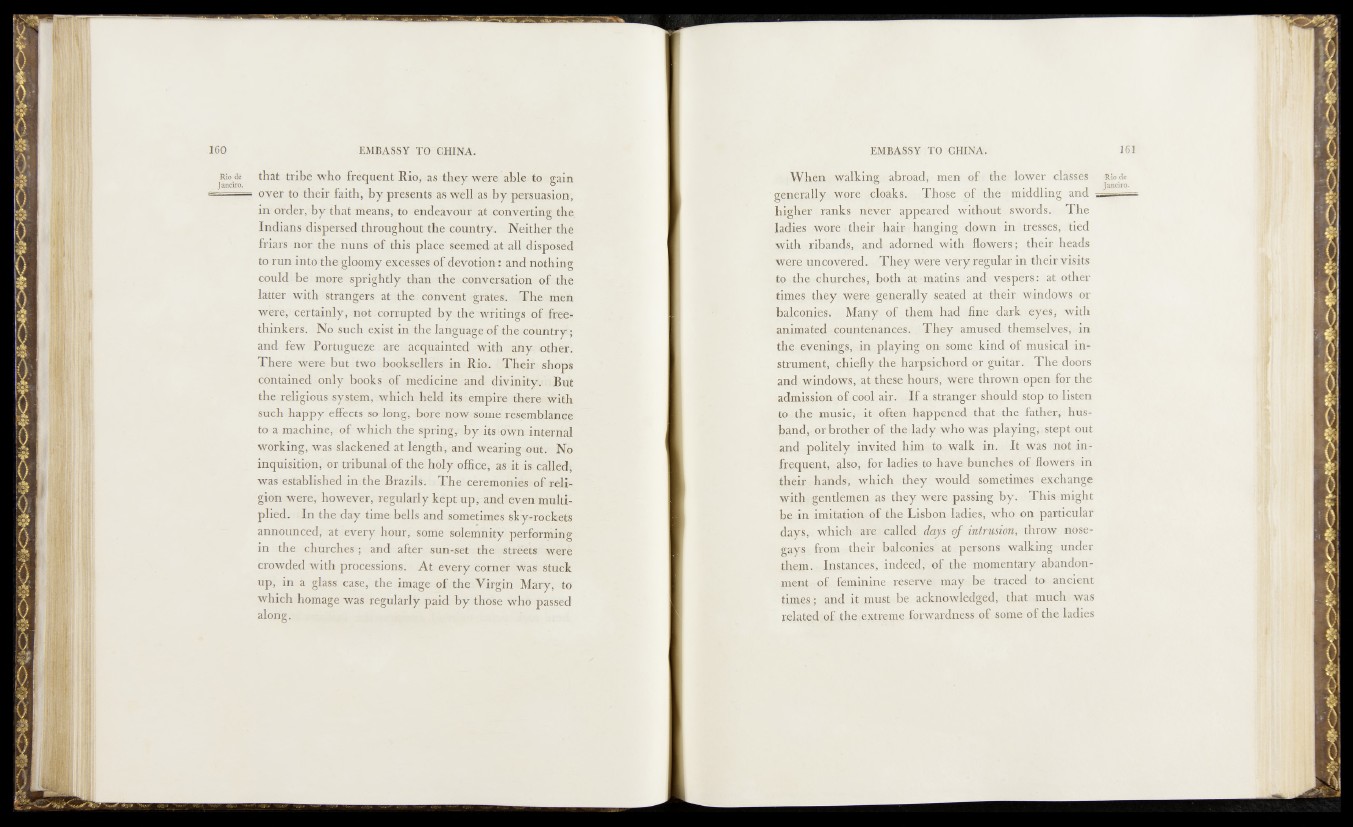
Rio dé
Janeiro. that tribe who frequent Rio, as they were able« to gain
over to their faith, by presents as well-as.by persuasions
in carder, by that means, to endeavour at converting the
Indians disposed throughout the country. Ifeittehtho
friars ;n«i £&& nuns' of this place seemed:at ail«i&posed
to run into the gloomy excesses of devotion s and nothing
could; be more sprightly than the conversation of the
latter with strangers at :the : convent .grates. The men
were, certainly, not. corrupted by thk writings ©I- freethinkers.
No such exist in the làd^gMg£®f the countrytj
and few Portugueze are. acquainted with any. other.
There were but two. booksellers in Rio- ; Their shops
contained only books of medicine, and divinity.-- IBut
the religions system, whichi held itsiempire thereÿ with
sucli happy effects sotteng, bore now -some resemblance
to a machine, o f which the s-pring/by its »own intern»!
working, was slackened at length, and wearing-out.- No
inquisition, or tribunal .of the holy office, as it is called ^
was established in. the Brazils. The ceremonies of-religion
were, however, regularly kept up, and even multiplied.
In the day tim&hells and sometimes sky-rockets
announced; at every hour, some solemnityperformlirg
in the churches j and .after, sun-set .the. streets
crowded with processions. At every corner was stuck
up, in a glass ease, the image of the Virgin Mary, to
which homage was regularly paid by those who passed
along.
■When walking abroad, men of? the! lower classes
gepeiphy,.wprel^cloaks-: f Those of the -middling and
higher cranks neverf appeared without swords.; The
ladies w$$ei their jhair* i hanging down in dresses?/tied
with- • ribands, and? «-adorned« with*1 flowers; their heads
^ega .^jicpverfed«”-' Th§y&vjfere yery regular in their visits
to «the^qhurchesisfbolh. lat'.matins «and vespfers: .at other
times they w^re ?g§herally seated at their. windows.1 or
Manyf of them had fine dark ;.esyes; with
animated-countenances. . Thjgy anvusedi themselves; in
the-evenings, in playing lonesome kind ofmhsieahiriT
stryment, chiefly the harpsichord QP>gqitar. The doors
and^yr-indows, at-these hours, were thrown «.open fqr the
admission of*©opl air. . If a stranger should stop to listen
to-;tfle music; it. often happened that■ the father^i husband,'
or brother o f ;the,lady who was playingsstept out
and politely invited hirn 'toi walk in. I t was not in-
frequent, also,:if°r ladiesj to have bunchespfrflowefs in
their hands, which they would sometimes«exchange
withigentlemen as; they were-,passing; byy* This might
be in imitation of the Lisbon ladies, who-on particular
days, which«* are| called days o f intrusion* thrQYf nose-
from their balconies’, at persons walking under
them.« Instances, indeed, ofythe «momentary: abandom-
pent of" feminine reserve; may-jbe ifracesL>to ancient
times« end it must-be acknowledged, that..much« was
related,of the extremeiforwardness.©if some of the ladies